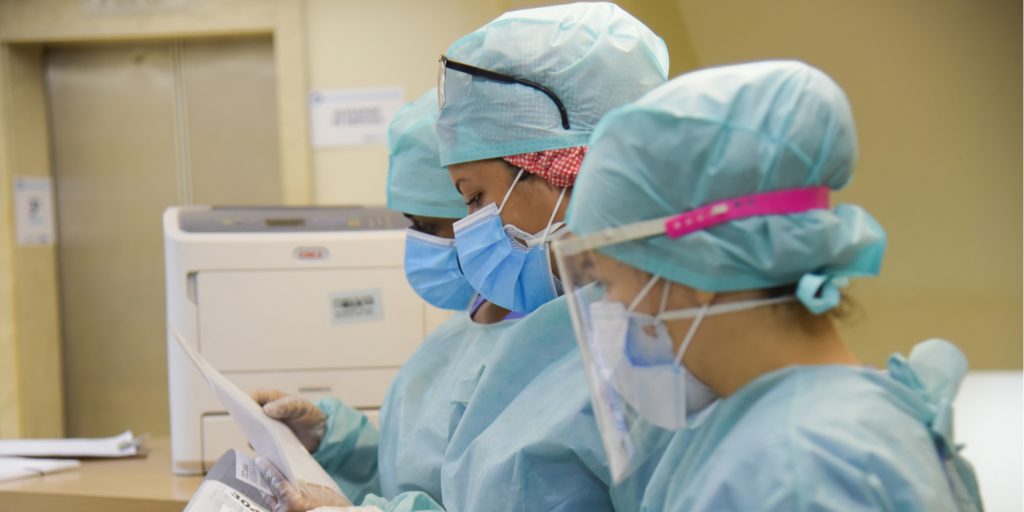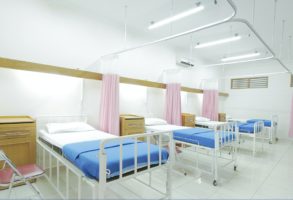
Published January 4, 2021
The New Atlantis - Winter 2021 issue
In the early weeks of the pandemic, New Yorkers paused every evening at seven o’clock to applaud the city’s frontline healthcare workers. The cheers, honking, and clattering of pots and pans could be heard from windows, fire escapes, and street corners as the city saluted those who repeatedly put themselves at risk for others. But as an August essay in the New York Times Magazine showed, many of these same frontline workers felt less supported in the hospitals where they were struggling to treat patients.
The story begins at a May conference meeting at Long Island Jewish Medical Center in Queens, which at the time had treated more Covid-19 patients than any other hospital in the country. The frontline physicians were exhausted and emotionally drained; they had spent months making grueling decisions about patient treatment, often at risk to their own health. Mangala Narasimhan, an intensive-care doctor, was anxious to return to her patients and knew that the discussion might be tense.
The meeting’s agenda included remarks by Alex Spyropoulos, a lead researcher and physician at Northwell Health system, of which Long Island Jewish is a part. Like dozens of other Northwell doctors, he had joined the conference via video, and addressed his colleagues from his home in Westchester. Spyropolous had been running a clinical trial to determine the most effective dose of an anti-clotting drug for severely ill Covid patients, and a member of his team had run into problems with a doctor on Narasimhan’s unit. As the Times article explained,
Stella Hahn, a pulmonary-critical-care doctor, arrived at work the day before the meeting to find that a Covid-19 patient had gone into cardiac arrest. She knew that the patient was enrolled in the clinical trial and had been randomly assigned to receive either the standard dose of the anticoagulant or the higher one. As is always the case in the most rigorous trials, neither the patient nor Hahn was supposed to know to which group this woman belonged. Double-blind, randomized, controlled trials — R.C.T.s — are considered the gold standard in research because they do not allow findings to be muddied by any individual doctor’s biases or assumptions. But Hahn believed that the patient’s condition now called for the higher dose, which could potentially require the patient’s removal from the trial.
A colleague of Spyropolous had called Hahn and urged her to reconsider for the sake of the trial, but Hahn had insisted that her responsibility was to the patient and that she had to rely on her own clinical judgment. During the meeting, Spyropolous emphasized that scientific progress demanded rigorous adherence to controlled trials, “even in the very stressful environment of a pandemic that was overwhelming our hospitals.” He went so far as to say that physicians’ relying on their own judgment rather than awaiting the results of RCTs was tantamount to “witchcraft.”
To the frontline doctors, Spyropolous’s comments were more than dispiriting: He seemed to be patronizing them while remaining detached from the medical emergencies at hand, placing data over the lives of individual patients.
This kind of fight was hardly limited to Northwell. As the Times article went on to explain, researchers across the country were pressing their practitioner counterparts “to slow down long enough to build a body of evidence that they knew with more certainty could help.” But to the physicians in emergency wards, every moment mattered. Pierre Kory, a critical-care doctor at the University of Wisconsin Hospital and Clinics, said that “it became like Republicans and Democrats. The two sides can’t talk to each other.”
Clashes like this have contributed to the uncertainty surrounding treatments for Covid-19. Of course, there have been many reasons for confusion about the virus: Early incorrect statements by the World Health Organization regarding the risk of contagion, a pair of infamously fraudulent studies in the Lancet and the New England Journal of Medicine, and panicked or blatantly political reactions by respected media outlets have all added to the general turmoil.
But the sense of disorientation also stems from a longstanding tension between two medical communities: practicing physicians and what might be called the academic-governmental establishment. Each group has its own sphere of influence, with practicing physicians acting as the authorities in immediate medical decision-making. Their academic counterparts in universities or government agencies, by contrast, are often removed from decisions that immediately affect patient care, yet they generally determine what tools and medicines are available to the public. Some doctors, such as those at university hospitals, may be part of both communities. But despite this overlap, there is a fundamental friction between the two, which often manifests in contrasting visions of how to evaluate evidence, approach patient care, and understand the role of the doctor.
Click here to read the rest of this article at The New Atlantis’s website.
Devorah Goldman is the Tikvah Visiting Fellow at the Ethics and Public Policy Center.








